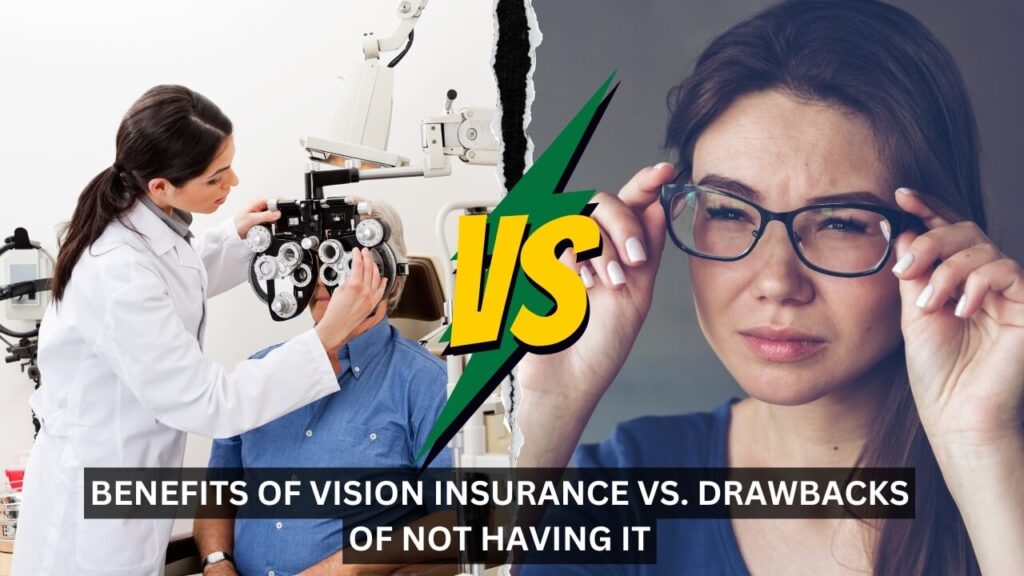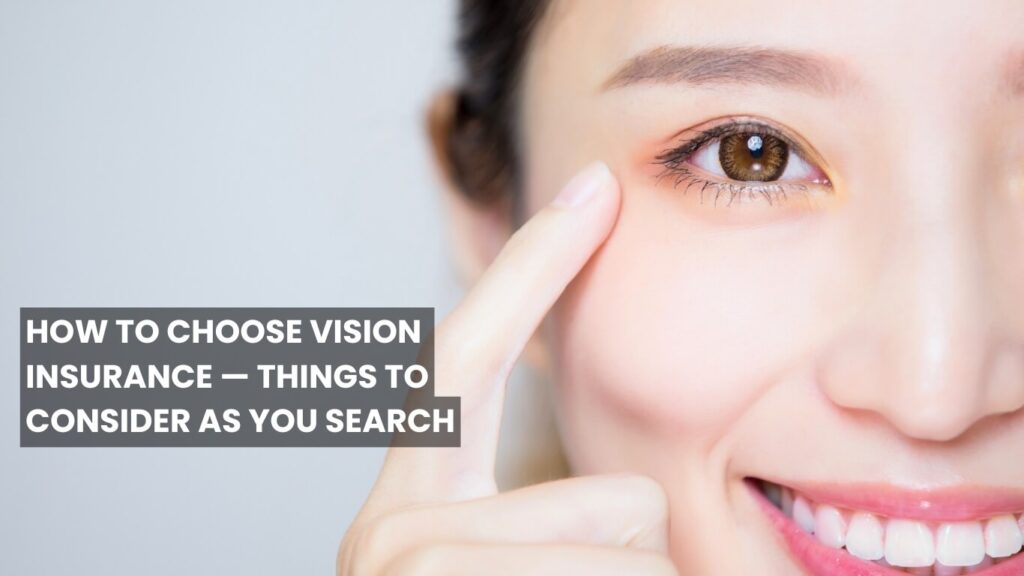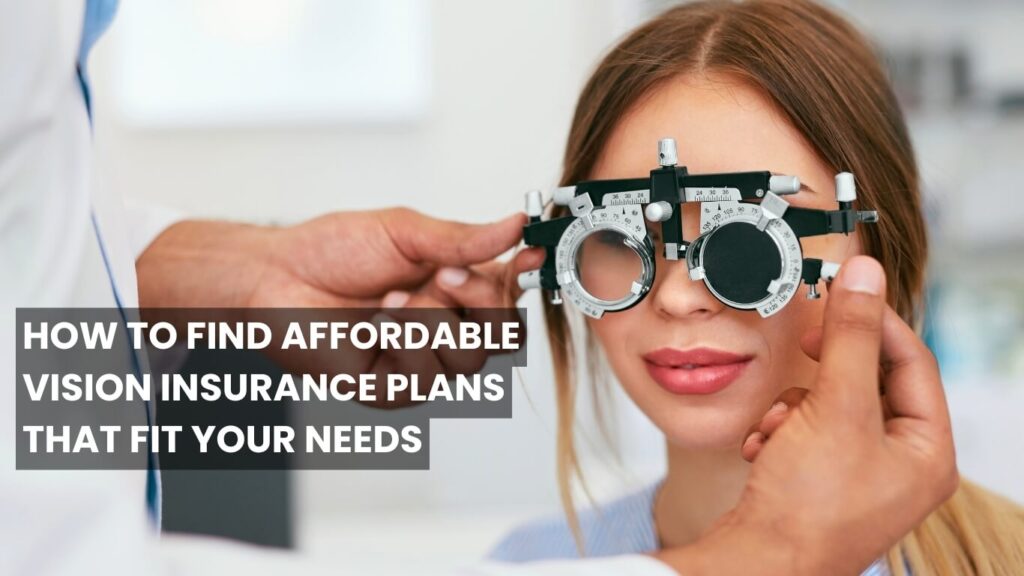What is Vision Insurance?
Vision insurance is a type of health coverage specifically designed to reduce the costs associated with eye care. It typically covers preventive eye health services such as routine eye exams and may offer benefits that help lower the cost of eyeglasses, contact lenses, and sometimes even procedures like LASIK.
Unlike major medical insurance, which can protect you from unexpected, high medical costs, vision insurance is a wellness benefit designed to provide routine eye care, prescription eyewear, and other vision-related services at a reduced cost.
This form of insurance is often available as an optional add-on in comprehensive health insurance plans or through an employer’s benefits package. For those who do not have access through an employer, individual vision coverage is also available. These plans are usually structured as either a vision benefits package or a discount plan, each offering various levels of coverage and savings depending on the specifics of the policy.
Why Should You Get Vision Insurance?
Investing in vision insurance is a proactive step toward maintaining overall eye health and vision quality. Here are several compelling reasons to consider obtaining vision insurance:
Cost Savings on Routine Visits:
Vision insurance plans typically cover the full cost or a significant portion of routine eye exams. Regular eye exams are essential not only for assessing your eyesight and prescribing corrective lenses but also for detecting early signs of eye conditions that could become more serious if left untreated.
Reductions on Eyewear Costs:
One of the most tangible benefits of vision insurance is the reduction in costs for eyeglasses and contact lenses. Most plans offer significant discounts on these items, which can be particularly beneficial for individuals and families who require multiple pairs of glasses or frequent replacements.
Coverage for Advanced Optical Needs:
For those requiring specialized optical products or services, such as progressive lenses, anti-reflective coatings, or prescription sunglasses, vision insurance can help manage the often higher costs associated with these items.
Preventative Health Care:
Regular eye exams can detect signs of more serious health issues like diabetes, high blood pressure, and high cholesterol. Early detection through an eye exam can lead to earlier and more manageable treatment for these conditions.
Enhanced Productivity and Quality of Life:
Good vision is crucial for most daily tasks and professional activities. Vision insurance supports maintaining optimal sight, which enhances productivity at work and improves quality of life through better performance in personal activities.
Affordable Vision Care Options:
With family vision insurance plans, the benefits extend to all family members, providing affordable eye care for households. This is especially valuable for families with children, as vision development is critical in the early educational years.
By reducing the financial burden of eye care, vision insurance encourages more frequent and timely eye exams and treatments, leading to better eye health and, by extension, overall well-being.
Benefits of Vision Insurance vs. Drawbacks of Not Having It

Benefits of Vision Insurance
1. Financial Protection:
Vision insurance significantly lowers the out-of-pocket costs for eye exams, glasses, and contact lenses. For those who need vision correction, these savings can add up quickly, especially if multiple family members require eyewear.
2. Regular Eye Care Encouragement:
With reduced costs, individuals are more likely to schedule regular eye exams, leading to the early detection and treatment of vision issues or other health concerns identified during eye check-ups.
3. Access to a Broad Network of Providers:
Most vision insurance plans offer a network of eye care professionals, ensuring that insured individuals have access to qualified optometrists and ophthalmologists near them.
4. Discounts on Advanced Services:
Beyond basic eye exams and eyewear, some insurance plans offer discounts on elective vision correction surgery, such as LASIK, which can otherwise be prohibitively expensive.
5. Coverage for Every Stage of Life:
Vision insurance plans often include benefits that scale with age, offering more comprehensive coverage for seniors who are more likely to encounter age-related vision problems.
Drawbacks of Not Having Vision Insurance
1. Higher Costs for Routine Care:
Without vision insurance, the full cost of eye exams and eyewear comes out of pocket. Over time, these expenses can become a significant financial burden, especially for those with severe vision impairments or families with multiple members needing glasses or contacts.
2. Delayed Diagnosis of Vision Problems:
Individuals without vision insurance might skip routine eye exams due to cost concerns. This delay can lead to the progression of untreated vision conditions, which might become more complex and expensive to treat later.
3. Missed Detection of Related Health Issues:
Eye health is linked to overall health; conditions like diabetes, high blood pressure, and high cholesterol can be detected through changes in eye health. Missing out on routine eye exams could mean missing early signs of these serious health conditions.
4. Limited Access to Quality Eye Care:
Paying out of pocket may limit one’s options to more affordable but potentially less comprehensive care providers, which can affect the quality of vision care received.
5. Economic Impact on Families:
For families, especially those with children needing regular vision updates, the absence of vision insurance can lead to significant economic strain, affecting family budgets and well-being.
Having vision insurance facilitates regular and affordable eye care, which not only maintains vision quality but also contributes to overall health monitoring. The drawbacks of not having coverage can lead to both higher long-term costs and potential health risks.

How To Choose Vision Insurance — Things to Consider as You Search
When selecting a vision insurance plan, it’s important to carefully evaluate several key factors to ensure the plan meets your vision care needs. Assess the coverage details to ensure the plan includes essential services like annual eye exams, eyeglasses, and contact lenses, and consider the financial aspects such as premiums, deductibles, co-pays, and out-of-pocket maximums.
Ensure the plan provides a broad network of qualified eye care providers and check for any limitations or exclusions that might affect your care. It’s also advisable to research the insurance provider’s reputation for customer service and claim handling, as this can greatly affect your overall satisfaction.
Lastly, consider the flexibility of the plan to ensure it allows you to purchase eyewear or receive care from your preferred providers or retailers, and look for any additional benefits that may enhance the value of the plan for your specific lifestyle needs.
Why Choose Vache Healthcare?
Vache Healthcare is an excellent choice for those seeking reliable and comprehensive vision insurance. Our plans are designed to provide extensive coverage options that include not only basic eye care like routine exams and eyewear but also discounts on vision correction procedures. We strive to make our plans affordable, ensuring that quality eye care is accessible to individuals and families without causing financial strain.
Our provider network includes highly qualified eye care professionals nationwide, ensuring that you can always find a top-tier specialist near you. Customer service is a cornerstone of our approach, with a dedicated team ready to assist with any questions or concerns.
Vache Healthcare plans are flexible, and designed to meet a variety of needs and preferences, whether you require individual coverage or a family plan. Our commitment to quality and customer satisfaction is why thousands of families trust us with their vision care needs, making Vache Healthcare a leading provider in the industry.
Frequently Asked Questions:
What does vision insurance typically cover?
Vision insurance plans generally cover preventive care such as routine eye exams, prescription eyewear, contact lenses, and discounts on elective vision correction surgery like LASIK. Coverage details can vary significantly between plans, so it’s important to review each plan’s specific benefits.
How often can I use my vision insurance to get a new pair of glasses?
Most vision insurance plans allow you to get a new pair of glasses or set of contact lenses every 12 to 24 months, depending on the specifics of the plan. It’s advisable to check the frequency of coverage in your policy to plan your purchases accordingly.
Can vision insurance save me money even if I have perfect vision?
Yes, even if you have perfect vision, vision insurance can be beneficial. It covers routine eye exams that can detect early signs of eye conditions or other health issues, potentially saving on future medical costs. Additionally, some plans offer discounts on protective eyewear, which can be useful even for those with perfect vision.
Is vision insurance worth it if I only need it for basic eye exams?
Vision insurance can be worth it for basic eye exams, as these exams can be costly without insurance. Regular eye exams are crucial for maintaining overall eye health and can catch potential problems early on. If your plan’s premium is less than the cost of an annual eye exam out-of-pocket, it may be financially beneficial.
How do I choose the right vision insurance plan?
When choosing a vision insurance plan, consider what type of coverage you need, the plan’s cost, the network of providers, limitations and exclusions, and any additional benefits. Also, evaluate your and your family’s vision care needs to determine if a plan geared towards families, individuals, or seniors would be most beneficial.
Can I use my vision insurance immediately after signing up?
Many vision insurance plans have a waiting period before you can use the benefits, especially for more significant services like surgery or expensive eyewear. However, basic benefits like eye exams might be available sooner. Check the terms of your specific policy to understand any waiting periods that may apply.








